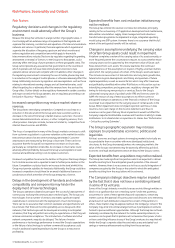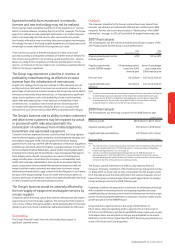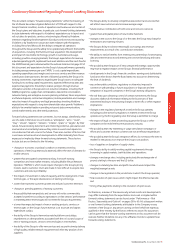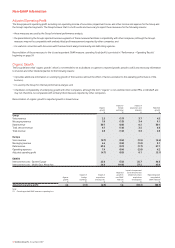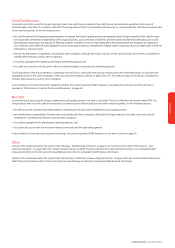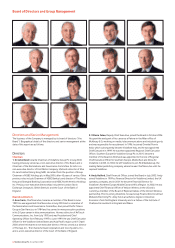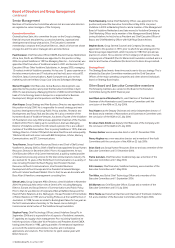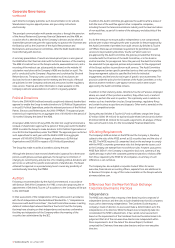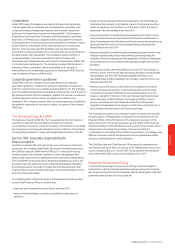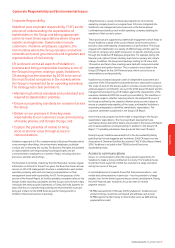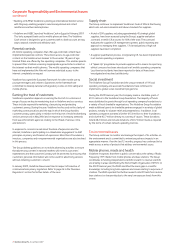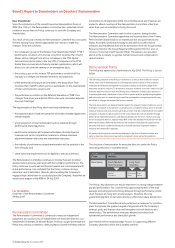Vodafone 2007 Annual Report Download - page 70
Download and view the complete annual report
Please find page 70 of the 2007 Vodafone annual report below. You can navigate through the pages in the report by either clicking on the pages listed below, or by using the keyword search tool below to find specific information within the annual report.
68 Vodafone Group Plc Annual Report 2007
Corporate Governance
continued
The following table shows the number of years directors have been on the
Board as at 1 April 2007 and their attendance at Board meetings they were
eligible to attend during the 2007 financial year:
Meetings
Years on Board attended
Sir John Bond 2 7/8
John Buchanan 4 8/8
Arun Sarin 7 8/8
Vittorio Colao (from 9 October 2006) <1 5/5
Andy Halford 1 8/8
Dr Michael Boskin 7 7/8
Lord Broers 9 8/8
Alan Jebson (from 1 December 2006) <1 4/4
Nick Land (from 1 December 2006) <1 4/4
Anne Lauvergeon 1 7/8
Professor Jürgen Schrempp 6 8/8
Luc Vandevelde 3 7/8
Anthony Watson 1 8/8
Philip Yea 1 8/8
Thomas Geitner (until 31 December 2006) n/a 5/5
Lord MacLaurin (until 25 July 2006) n/a 2/2
Paul Hazen (until 25 July 2006) n/a 2/2
Sir Julian Horn-Smith (until 25 July 2006) n/a 2/2
Penny Hughes (until 25 July 2006) n/a 2/2
In addition to regular Board meetings, there are a number of other meetings
to deal with specific matters. Directors unable to attend a Board meeting
because of another engagement, as was the case for a number of directors in
the year, are nevertheless provided with all the papers and information
relevant for such meetings and are able to discuss issues arising in the
meeting with the Chairman or the Chief Executive.
Chairman and Chief Executive
The roles of the Chairman and Chief Executive are separate and there is a
clear division of responsibilities that is clearly established, set out in writing
and agreed by the Board to ensure that no one person has unfettered powers
of decision. The Chairman is responsible for the leadership of the Board,
ensuring its effectiveness and setting its agenda, and the Chief Executive is
responsible for day-to-day running of the business and for ensuring the
implementation of Board strategy and policy.
Board balance and independence
The Company’s Board consists of 14 directors, 11 of whom served throughout
the 2007 financial year. At 31 March 2007, in addition to the Chairman,
Sir John Bond, there were three executive directors and ten non-executive
directors. The Deputy Chairman, John Buchanan, is the nominated Senior
Independent Director and his role includes being available for approach or
representation by directors or significant shareholders who may feel inhibited
from raising issues with the Chairman. He is also responsible for conducting
an annual review of the performance of the Chairman and, in the event it
should be necessary, convening a meeting of the non-executive directors.
Sir John Bond became the Chairman of the Company following the
retirement of Lord MacLaurin and John Buchanan succeeded Paul Hazen as
the Deputy Chairman and Senior Independent Director. The Company
considers all of its present non-executive directors to be fully independent.
The executive directors are Arun Sarin (Chief Executive), Vittorio Colao and
Andy Halford.
The Board is aware of the other commitments of its directors and is satisfied
that these do not conflict with their duties as directors of the Company. The
names and biographical details of the current directors are given on pages 64
to 65. Changes to the commitments of the directors are reported to the
Board.
Under the laws of England and Wales, the executive and non-executive
directors are equal members of the Board and have overall collective
responsibility for the direction of the Company. Non-executive directors have
a particular responsibility to constructively challenge the strategy proposed
by the Chief Executive and executive directors, to scrutinise and challenge
performance, to assess risk and the integrity of financial information and
controls and to ensure appropriate remuneration and succession planning
arrangements are in place in relation to executive directors and other senior
executive roles.
Appointments to the Board
There is a formal, rigorous and transparent procedure, which is based on merit
and against objective criteria, for the appointment of new directors to the
Board. This is described in the section on the Nominations and Governance
Committee set out on page 70. Individual non-executive directors are generally
expected to serve two three-year terms. At the end of the second three-year
term, a rigorous and detailed analysis is undertaken and only then is a non-
executive director invited to serve a third term. Our non-executive directors are
generally not expected to serve for a period exceeding nine years. The terms
and conditions of appointment of the non-executive directors are available for
inspection at the Company’s registered office and will be available for
inspection at the AGM from 15 minutes before the meeting until it ends.
Vittorio Colao, Alan Jebson and Nick Land were appointed during the year
ended 31 March 2007. Since the end of the 2007 financial year a further non-
executive director, Simon Murray, has been appointed to the Board with effect
from 1 July 2007. Biographical details of Mr Murray are given on page 65.
Information and professional development
Each member of the Board has immediate access to a dedicated online team
room and can access monthly information including actual financial results,
reports from the executive directors in respect of their areas of responsibility
and the Chief Executive’s report which deals, amongst other things, with
investor relations, giving Board members an opportunity to develop an
understanding of the views of major investors. These matters are discussed at
each Board meeting. From time to time, the Board receives detailed
presentations from non-Board members on matters of significance or on new
opportunities for the Group. Financial plans, including budgets and forecasts,
are regularly discussed at Board meetings. The non-executive directors
periodically visit different parts of the Group and are provided with briefings
and information to assist them in performing their duties.
The Chairman is responsible for ensuring that induction and training
programmes are provided and the Company Secretary organises the
programmes. Individual directors are also expected to take responsibility for
identifying their individual needs and to take steps to ensure that they are
adequately informed about the Company and their responsibilities as a
director. The Board is confident that all its members have the knowledge,
ability and experience to perform the functions required of a director of a
listed company.
On appointment, individual directors undergo an induction programme
covering, amongst other things, the business of the Group, their legal and
regulatory responsibilities as directors of the Company, briefings and
presentations from relevant executives and opportunities to visit business
operations. If appropriate, the induction will also include briefings on the
scope of the Internal Audit function and the role of the Audit Committee,
meetings with the external auditor and other areas the Company Secretary
deems fit, considering the director’s area of responsibility. The induction
process is designed to: build an understanding of the Group, its businesses
and the markets and regulatory environments in which it operates; provide an
overview of the responsibilities of a non-executive director of the Company;
establish links to Group’s employees; and develop an understanding of the
Group’s main relationships.
The Company Secretary provides a programme of on-going training for the
directors, which covers a number of sector specific and business issues, as
well as legal, accounting and regulatory changes and developments relevant
to individual directors’ areas of responsibility. Throughout their period in
office, the directors are continually updated on the Group’s businesses and
the regulatory and industry specific environments in which it operates. These
updates are by way of written briefings and meetings with senior executives
and, where appropriate, external sources.


